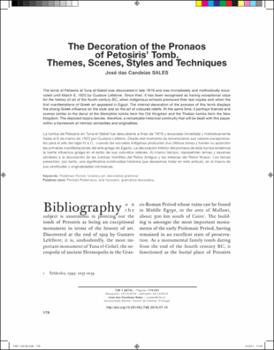The Decoration of the Pronaos of Petosiris’ Tomb. Themes, Scenes, Styles and Techniques
Autor
Sales, José das CandeiasFecha
2016Resumen
La tumba de Petosiris en Tuna el-Gebel fue descubierta a fines de 1919 y excavada inmediata y metódicamente
hasta el 8 de marzo de 1920 por Gustave Lefebve. Desde ese momento se reconocieron sus valores excepcionales
para el arte del siglo IV a.C., cuando las escuelas indígenas producían sus últimas obras y hacían su aparición
las primeras manifestaciones del arte griego en Egipto. La decoración interior del pronaos de esta tumba evidencia
la fuerte influencia griega en el estilo de sus coloridos relieves. Al mismo tiempo, representan temas y escenas
similares a la decoración de las tumbas menfitas del Reino Antiguo y las tebanas del Reino Nuevo. Los temas
presentan, por tanto, una significativa continuidad histórica que deseamos tratar en este artículo, en el marco de
sus similitudes y originalidades intrínsecas. The tomb of Petosiris at Tuna el-Gebel was discovered in late 1919 and was immediately and methodically excavated
until March 8, 1920 by Gustave Lefebvre. Since then, it has been recognised as having exceptional value
for the history of art of the fourth century BC, when indigenous schools produced their last copies and when the
first manifestations of Greek art appeared in Egypt. The internal decoration of the pronaos of this tomb displays
the strong Greek influence on the style and on the art of coloured reliefs. At the same time, it portrays themes and
scenes similar to the decor of the Memphite tombs from the Old Kingdom and the Theban tombs from the New
Kingdom. The depicted topics denote, therefore, a remarkable historical continuity that will be dealt with this paper,
within a framework of intrinsic similarities and originalities.





